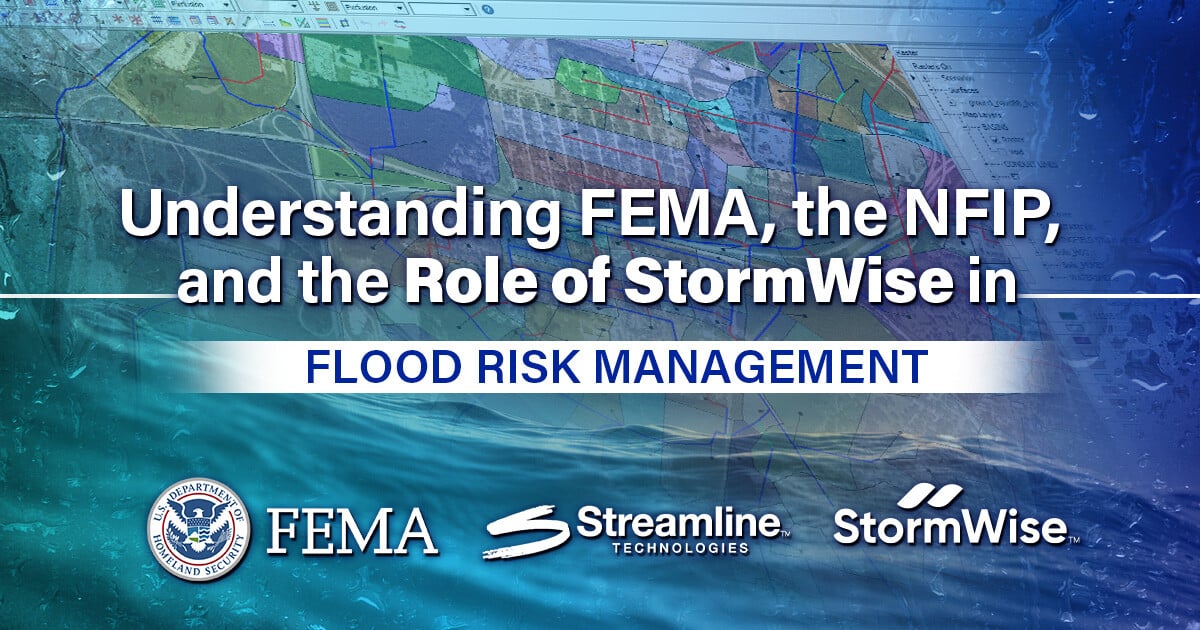Flood risk management is crucial for building resilient communities, especially in the face of increasing flood risks and extreme weather events. At the heart of these efforts are two critical players: the Federal Emergency Management Agency (FEMA) and the National Flood Insurance Program (NFIP). Together, they provide a safety net that protects communities, minimizes damage, and helps people and businesses recover quickly after a flood.
Streamline Technologies’ innovative StormWise Pro and StormWise Expert software solutions offer powerful tools to help communities meet FEMA and NFIP standards, enabling better flood planning, more accurate risk assessment, and compliant floodplain management.
The Role of FEMA and the NFIP in Flood Protection
Established in 1979, FEMA was created to coordinate disaster response across the United States, especially in situations that overwhelm local and state resources. Beyond its vital role in disaster recovery, FEMA works to mitigate risks by funding preparedness, training first responders, and partnering with local agencies to reduce the impact of potential disasters. FEMA’s mission is SIMPLE: to help people before, during, and after disasters.
One of FEMA's key initiatives is the National Flood Insurance Program (NFIP), which provides affordable flood insurance to homeowners, renters, and businesses. Flood insurance through the NFIP is vital because it covers flood damage, which is typically excluded from standard homeowners’ policies. Just an inch of floodwater can cause thousands of dollars in damage, making flood insurance a critical asset for those in flood-prone areas. By offering financial protection, the NFIP enables families and businesses to recover faster after floods, reducing the economic toll on communities.
The Importance of NFIP Standards
To qualify for NFIP coverage, communities must adopt FEMA-mandated floodplain management regulations. These guidelines help minimize flood risks for construction projects, protecting both lives and property.
NFIP’s floodplain regulations also lay the groundwork for safer, more resilient communities by enforcing construction standards that reduce the likelihood of flood-related damage. As part of these efforts, FEMA certifies certain hydrologic and hydraulic models that engineers and planners can use to develop compliant flood hazard maps and analyze flood risks accurately.
How StormWise Pro and Expert Aid in Flood Risk Management
Streamline Technologies' StormWise Pro and Expert software play a significant role in helping communities meet FEMA and NFIP flood hazard mapping requirements. Both products are FEMA-accepted for NFIP compliance and are trusted by several local agencies, including those in Florida, Texas, South Carolina, Indiana, and Missouri, for their exceptional modeling capabilities.

- StormWise Pro: A versatile tool for hydrologic and hydraulic (1D) modeling, StormWise Pro offers invaluable support for water resources and drainage projects, from small single-site developments to large comprehensive watershed studies. With features such as a distributed hydrology approach, it allows users to perform single-event simulations with automated data intake from map layers. The result? Clear, customizable reports and animated profiles that aid in understanding flood impacts.
- StormWise Pro is accepted nationally by FEMA for NFIP purposes
- StormWise Expert: Going beyond 1D modeling, StormWise Expert provides robust two-dimensional (2D) modeling capabilities, enabling continuous simulation and intricate graphics for visualizing surface water and groundwater. The software uses flexible irregular triangular meshes to develop hybrid 1D/2D models that are fully integrated and can optionally include groundwater dynamics, making it especially useful for floodplain analysis and hazard mapping in areas with unique local hydrology.
- StormWise Expert is accepted by FEMA for NFIP purposes in:
- The State of Florida
- The City of Lubbock, Texas
- Georgetown County, South Carolina
- The City of Lafayette, Indiana
- The City of Chesterfield, Missouri
- StormWise Expert is accepted by FEMA for NFIP purposes in:
By using StormWise Pro and Expert, cities and engineering firms can identify flood risks accurately, plan development projects with reduced costs, and ensure compliance with federal floodplain regulations. This aligns with FEMA’s Title 44, Chapter 1, of the Code of Federal Regulations (44 CFR) Paragraph 65.6(a)(6), which outlines the minimum standards for flood hazard mapping models used in NFIP.
Accepted Models and Why They Matter
FEMA categorizes approved modeling tools into two primary groups: Nationally Accepted Models and Locally Accepted Models.
Nationally accepted models address broad applications, including coastal, hydrologic, hydraulic, and statistical modeling. Locally accepted models are tailored for specific areas, considering unique regional flood conditions. StormWise’s acceptance by FEMA as both a nationally and locally approved model underscores its value for communities across the country, equipping them with reliable data to make informed flood management decisions.
Streamline Technologies’ Commitment to Compliance and Community Support
At Streamline Technologies, our mission is to advance innovation in water resources, stormwater management, hydrologic & hydraulic (H&H) modeling, and flood forecasting for improved resiliency and sustainability in the world around us. Meeting FEMA and NFIP standards is critical to safeguarding lives, properties, and local economies from flood hazards, and we’re proud to contribute to this mission.
If your city or agency is not yet on FEMA’s list for StormWise Expert acceptance and you are applying a 2D model, reach out to us. We have a simple streamlined process in place to help expand the use of our models to new areas, ensuring all communities have the tools they need to stay compliant, prepared, and protected.
Flood management is a shared responsibility, with local, state, and federal agencies, as well as the private sector, all playing pivotal roles. At Streamline Technologies, we’re here to provide the expertise, support, and solutions that empower communities to better understand, plan for, and mitigate flood risks.
For more information on FEMA’s numerical models meeting the minimum requirements of the National Flood Insurance Program visit FEMA’s website HERE to learn more!
TAGS
Blogs